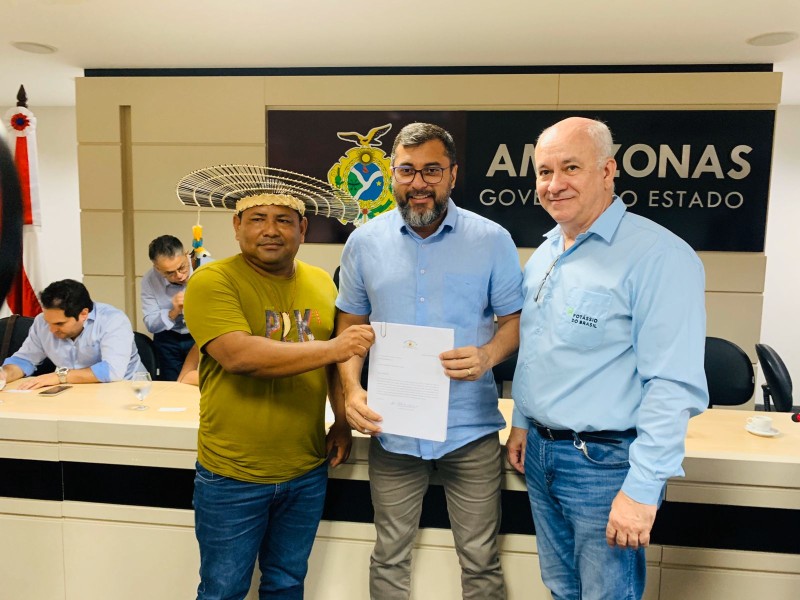
In a significant development for Brazil Potash’s Autazes potash project in the Amazonas State of Brazil, the Mura Indigenous people have voiced their support for the project. The Mura recently concluded free, prior, and informed consultations and participated in a vote which resulted in unanimous favour of the project’s construction. This decision signals a meaningful demonstration of the Mura’s wishes and is an important step in the project’s advancement.
Leaders of the Mura community from Autazes, who represent 36 villages and around 12,000 indigenous residents, made a formal visit to the Government of Amazonas’ headquarters on Monday, September 25th. During this visit, they submitted a report and record of a General Assembly meeting that took place the previous week among indigenous chiefs in Autazes. This assembly ratified the community’s decision to support the Autazes Potash Project. The event also saw the participation of Potássio do Brasil, as well as state deputies, secretaries, and the president of IPAAM, the environmental licensing agency responsible for the project.
Wilson Lima, Governor of Amazonas, commented: “This is a very important day, a historic day because we are taking a significant step towards changing the lives of the people who reside in the state of Amazonas, especially those in the municipality of Autazes. This is a fundamental step, and I consider it the most important one, which is the process of consulting the Mura people about the potassium exploration activity in the municipality of Autazes. We are talking here about another economic model for the state of Amazonas. We have the Zona Franca, which we will not relinquish, we have the natural gas issue, which we have already made significant progress on, and the next step is the potassium matter.”
José Cláudio dos Santos Pereira, the general coordinator of the Indigenous Mura Council (CIM), said, “For us, this is very important because it represents the future, the economic progress of Autazes and the state of Amazonas. But it is important to emphasize that the Mura people understand that we are working alongside the Federal Justice, and we do not intend to challenge it. We understand that IPAAM is the licensing authority and should proceed with the process.”
Adriano Espeschit, the president of Potássio do Brasil, weighed in on the importance of the project to global food security and ending world hunger: “This is a new moment for Autazes, for Amazonas, for Brazil, and why not say it for the world, as food security depends on fertilizers for agriculture, to feed people and eradicate hunger in our world. As President Lula said at the opening of the UN Assembly, over 750 million people are suffering from hunger. This is a strategic project to end world hunger. We will work on the next steps to advance licensing and begin the project’s installation in Autazes.”
Governor Wilson Lima of Amazonas stated that the Mura people’s endorsement is pivotal not only for the Autazes municipality but also for the broader Amazonas region. He mentioned the possibility of establishing a new economic model for the state based on this support. José Cláudio dos Santos Pereira, the general coordinator of the Indigenous Mura Council (CIM), represented the Mura community during this occasion. He presented a letter and a report from the General Assembly, confirming that indigenous leaders have accepted the project’s implementation.
The meeting also included several key figures alongside the indigenous leaders. These individuals included the president of Potássio do Brasil, state deputies, and state secretaries overseeing Economic Development, Science, Technology, and Innovation, Mining, Gas, and Energy, as well as the President of the Amazonas Environmental Protection Institute (Ipaam) and the mayor of Autazes.
While the project is not situated on indigenous land, it falls within 10 kilometres (around 6 miles) of two indigenous reserves. These communities hold the legal right to consultation in accordance with International Labour Organization 169 protocols. The Mura people had the autonomy to determine which tribes would be consulted, as well as the format for consultation and vote support threshold. A series of gatherings were conducted to inform the Mura about the project’s potential impacts and benefits. Ultimately, consultations took place with 36 tribes, some located as far away as 70 kilometers (about 45 miles) from the project site. A vote was organized with the participation of over 200 Mura individuals, culminating in a positive outcome in favor of the project.
The Mura community stands to gain various benefits from the development of the Autazes Potash Project. These benefits include opportunities for direct employment, funding for new businesses that can contribute to the project and local community, and the initiation of several programs aimed at improving general well-being as dictated by the Mura’s wellness program.
It’s worth noting that Brazil Potash still awaits a review from Brazil’s government Indigenous people’s agency, FUNAI, concerning the Company’s Indigenous Consultation Study (the “ECI”). This review is one of the final steps necessary for obtaining the Installation License needed to commence project construction. The Mura’s informed and positive vote undoubtedly sends a constructive signal to FUNAI, emphasizing the community’s wish for the project to proceed and for the necessary permits to be granted.



 Follow us on Twitter
Follow us on Twitter Become our facebook fan
Become our facebook fan










Comments are closed.